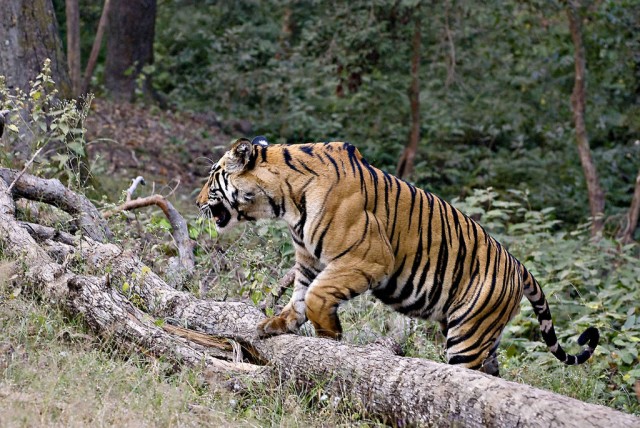Dehra Dun : The worst fears of wild life lovers in this small hill state have only turned out to be true. Information given in reply to a question under the Right to Information by the Chief Conservator of Forests, Uttarakhand, as many as 55 tigers and 564 leopards were killed in the state between 2001 and 2013, Four tigers and 91 leopards had also been declared man eaters during this period.
 But what has shocked them is the fact that Rajaji Sanctuary authorities arrested on Friday, two members of the nomadic van gujjars, who live in the forests of the state, for the death of a tiger, that had been found dead in the Gohari range of the sanctuary about a month back. It is alleged that the duo had laced pig meat with poison to kill the tiger in a bid to avenge the killing of their buffaloes by the felines.
But what has shocked them is the fact that Rajaji Sanctuary authorities arrested on Friday, two members of the nomadic van gujjars, who live in the forests of the state, for the death of a tiger, that had been found dead in the Gohari range of the sanctuary about a month back. It is alleged that the duo had laced pig meat with poison to kill the tiger in a bid to avenge the killing of their buffaloes by the felines.
The Bareilly situated Indian Veterinary Research Institute (IVRI) had confirmed that the tiger had died as the pig meat that someone had places ad bait had been laced with poison. Incidentally, this was also the first case in which a tiger had been poisoned to death and fears were being apprehended that it could be the handiwork of some local villagers, but not the van gujjars, who are portrayed as protectors of wild life.
In fact a well known NGO of the city and its chairperson have been raising the issues of the van gujjars for decades now. It has been spearheading their agitation for allowing this nomadic tribe to continue to live in the forests and not remove them outside the Sanctuary and Park areas of the state, by portraying them as one of the biggest preservers of wild life in the state.
The NGO had been hitting hard at the state forest department and its staff and accusing them of coming down heavily on the van gujjars. All allegations and accusations made by the forest department that the nomadic tribal community members were actually helping poachers by guiding them to where the animals were moving in the forests were denied vehemently by the NGO.
A number of times the state forest department staff has come out openly against the van gujjars saying that though some of them had been allotted land outside the forests so that they could move out with their cattle but still the gujjars continued to live in the forests. Each time the cause of the van gujjars was taken up by the NGO.
A journalist with over 40 years of experience, Jagdish Bhatt was Editor, Hill Post (Uttarakhand).
Jagdish had worked with India’s leading English dailies, which include Times of India, Indian Express, Pioneer and several other reputed publications. A highly acclaimed journalist, he was a recipient of many awards
Jagdish Bhatt, aged 72, breathed his last on 28th August 2021 at his Dehradun residence.



who is this ngo?